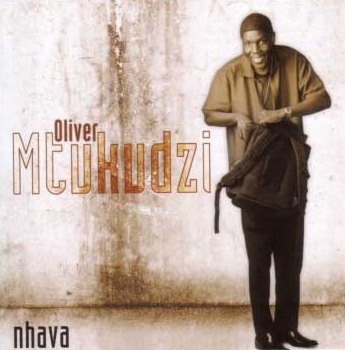
 Heads
Up Records is a great supporter of African Jazz/Pop. Most of you
know the Heads Up Africa series "Smooth Africa I" and
"Smooth Africa II",
Ladysmith Black Mambazo 's "No
Boundaries" or Miriam Makeba's "Reflections". This time Heads Up Records is presenting an
artist from Zimbabwe. Oliver Mtukudzi who already announced his US tour
will release his 49th album on April 26th 2005.
Heads
Up Records is a great supporter of African Jazz/Pop. Most of you
know the Heads Up Africa series "Smooth Africa I" and
"Smooth Africa II",
Ladysmith Black Mambazo 's "No
Boundaries" or Miriam Makeba's "Reflections". This time Heads Up Records is presenting an
artist from Zimbabwe. Oliver Mtukudzi who already announced his US tour
will release his 49th album on April 26th 2005.
Heads Up Records comment about
this release: "In a recent interview "Tuku," as he is
affectionately known, said Nhava is premised on a story about the
fortunes or misfortunes of a young person who leaves home in search of
a better life overseas. The album is relevant to the Zimbabwean
situation where more than three million people have gone into the Diaspora
in search of a better living. Nhava explores the effects of
migrant labor where families leave their homes in search of greener
pastures only to discover that life is not as rosy as they are made to
believe. This has already been witnessed by hundreds of Zimbabweans
who are being deported on a daily basis from the United Kingdom."
Oliver Mtukudzi is playing a special style of music named after his
nick-name "Tuku", guitar riffs combined with Zulu-rhythms
and Mbaqanga-choirs of the townships. The title "Nhava" of
his debut album at Heads Up Records is named after the Zimbabwean word
for "carrying bag". The first song "Ninipa"
is his call to Humility, which opens the door of life.
"Izere
Mhepo" talks about the misconception among many
Zimbabweans, those who went abroad and those remaining behind. Tuku
names the Zimbabweans in exile "hunters". The hunters bag
(nhava) is empty. As Tuku says, the bag is literally full of air.
"Pindirai"
is Oliver Mtukudzi critic about the behavior of his country people
chopping down trees recklessly and dumping rubbish in rivers spoiling
their natural resources. Oliver Mtukudzi wraps up critical words with
intriguing music.
"Menva
Kudzimbais" a poetic piece that celebrates the power of
unity. Tuku is conjuring comparisons to the African animal world.
Hazvireve
is a smoothly re-worked rendition of Tuku's old favorite. It's a song
about a father addressing his child he never met. Tuku has contributed
music and efforts to many AIDS-projects and documentaries especially
in relationship to Childs. He also wrote and directed the musical
production "Was My Child" (Plight of the Street Children) in
the mid '90s.
Hope
is Tuku's reveille for those who have difficulties to leave their beds
and go to work. "You have to learn to rise early and work because
time does not wait for anyone." Tuku combines repeating guitar
riffs with a hypnotic sing-sang to a captivating song.
Tiregerereiwo
is a cracking uptempo tune which is already in the South African
charts. A typical African song with Tuku's rough vocals, guitars and a
driving organ sound.
Handiro
Dambudziko is another nicely packed advice: we should attend to
the more urgent and dangerous problems instead of rushing to settle
minor, less visible ones. Assess, then priotise.
In Tiri
Mubindu Tuku is lamenting about the departed loved ones. We are
all flowers in God's garden and have to leave it one after another.
That's by the way the first song on which I heard a singer's cough. It
fitted.
Dzokai
is an old song from the Shona culture in a modern dress. Let the new
leader take over!
Tozeza
(formerly known as Tozeza Baba), is a very sad song about a child complaining
the violence of his drunken father. Tuku doesn't hesitate to sing
about critical situation and failing humans. I especially like the
rhythm part at the end of the song with the booming pot drums.
In the final tune Dzidziso
Mtukudzi asks for the Lord to teach him to be thankful and grateful
and the courage to say sorry whenever he makes a mistake.
With "Nhava" Oliver
Mtukudzi has delivered a great bag (70 minutes) full of advices and
practical philosophy well-performed in his own African way.


